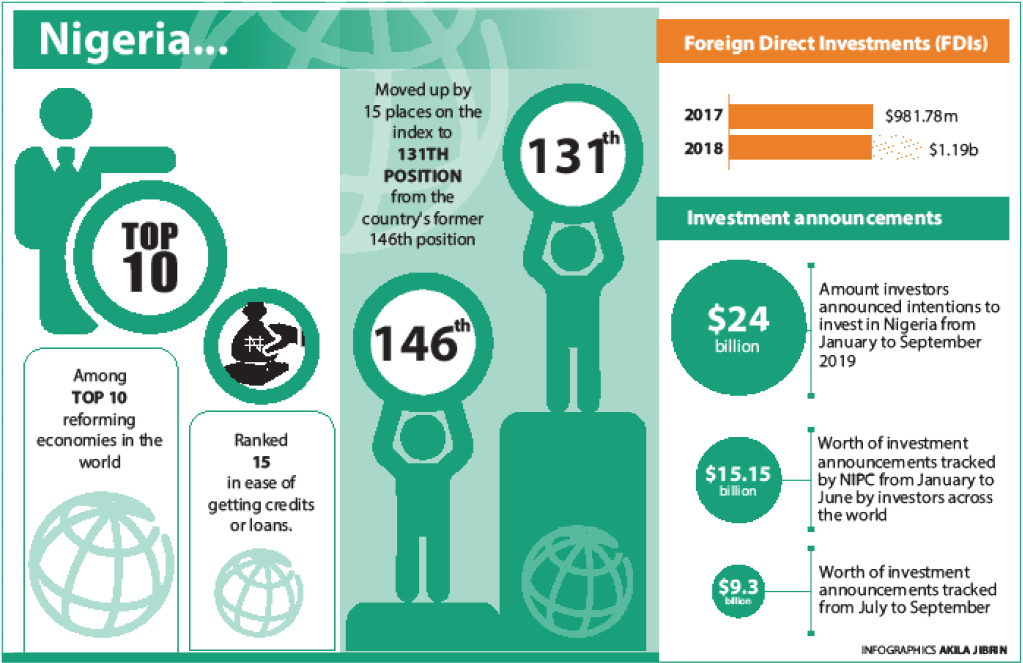Last week, we considered the current metrics for measuring ease of doing business as prescribed by the World Bank and I posited that quite a number of the metrics, such as ‘ease of declaring bankruptcy’, ‘ease of paying taxes’, ‘ease of cross border trade’, ‘ease of construction permits’, etc, were not particularly relevant to the millions of small businesses that we have in Nigeria.
I, therefore, proposed that we think hard about the problems that businesses face here, such as the chokehold of oligopolies that crowd them out, bad regulation (whereby companies are exploited rather than properly supervised by regulators), low purchasing power among the citizens and so on. These are metrics that we can improve for better results. This week I conclude the article
I believe we should include also, transparency in procurement. By this, it meant that opening a company at the Corporate Affairs Commission is no big deal but getting jobs and businesses is the ‘gbogah!!’. However, whether in the private or public sector, procurement is a very opaque system as procurement officers have their preferred choices (some even own companies that get the contracts). In almost every situation, businesses encounter situations where they have to pay huge bribes. This corruption metric is one thing that our government must try to wrestle down. It will be a good thing to measure how such incidences reduce even if we know we cannot eradicate them. The private sector is also equally as corrupt and almost as inefficient as the public sector. Nothing goes for nothing in Nigeria.
I added better regulation because this is one thing that precludes our companies from attaining very high standards to compete internationally. Nigerians have a very wrong understanding of theregulation as regulators just turn their platform into opportunities to milk small companies dead. Local businesses now do everything to avoid regulation, including forging certificates, faking things like NAFDAC numbers etc; actions that later come to bite their businesses. What is more? Many of our large businesses whom many look up to are fond of owing contractors for years until those small businesses collapse. Should I mention names?
There are other real issues that hold Nigerian businesses down, as I have captured above, such as our generally bad reputation as a people and a country. This means that, unlike the foreign companies for which the WB EODB report was designed, our indigenous businesses could never access foreign countries easily, thus limiting their growth. Also, our bad reputation (solidified by some of the terrible things some of our people do abroad), excludes Nigeria from legit capital inflows from foreigners and our diasporans alike, thereby limiting opportunities for business growth.
Many countries around the world are hostile to Nigerians and don’t give our young ones visas. This limits the number of ideas that can be imported from abroad via exposure to innovations through travel. I added crony capitalism and the influence of oligopolies because here in Nigeria, most large markets are dominated by oligopolies (such as cement, sugar, salt, wheat and even crude oil, petrol, diesel and aviation oil). These are guys who will ensure they run out new entrants and have been alleged to have connived to increase prices to the detriment of the polity. Crony capitalism is a situation where those in government often give undue advantage to their cronies, thus unbalancing the playing field and making life difficult for unconnected businesses.
Low purchasing power among the populace is one factor I added to my own EODB index for local businesses. Add to this, the increasingly prohibitive rental and property acquisition costs. Landlords are wont to exploit businesses especially if they believe such businesses are doing well. On the flip side, however, generally low purchasing power means that eventually, most businesses will struggle as Nigerians have less and less disposable income. A prosperous citizenry translates to healthy and profitable companies.
I believe that these factors that I have listed may be easier to measure and relate directly to the vast majority of the businesses in Nigeria. I wish some of the points may be adopted and the general idea, refined.
Lastly, I just want to say that the best place for anyone to do business – based on my own experiences and empirical evidence – is in one’s own country. Connections and networks are essential to business anywhere in the world. No one should be deceived that a Nigerian will do better in business in the UK or USA just because the processes for opening businesses there may be less cumbersome than what obtains here. I have realised that the schools you attended and where you worked and who you know have a lot to do with business success because you need doors to be opened for those wonderful ideas of yours. So, in our analysis, we need not scare our younger ones away from doing business in their country. Indeed, here in Nigeria is where the vast opportunities are, and we had better position our growing youths to take full advantage of these opportunities rather than remain vuvuzelas for foreign capital and foreign firms, most of whom are now thumbing their noses at us.

 Join Daily Trust WhatsApp Community For Quick Access To News and Happenings Around You.
Join Daily Trust WhatsApp Community For Quick Access To News and Happenings Around You.


